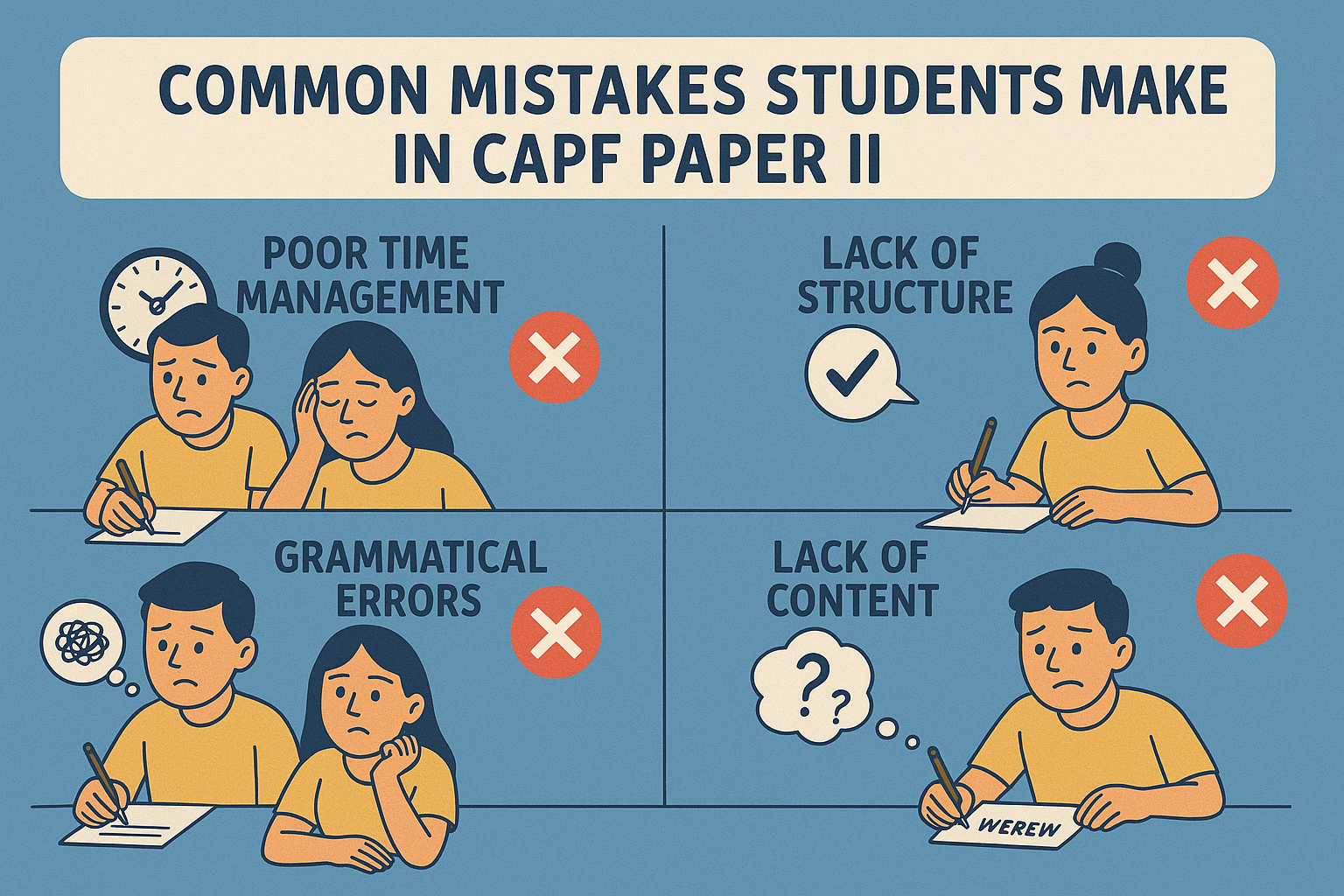Acing CAPF Paper II depends less on raw memory and more on technique: reading accurately, structuring answers, managing time, and presenting polished language. Below is a practical, in-depth guide to the most common mistakes candidates make — why they harm scores, how to fix them, and quick drills to improve fast.
Top 12 Common Mistakes (with fixes)
1. Poorly reading the question/comprehension passage
Why it costs marks: Misreading leads to irrelevant answers and loss of easy marks.
Fix: Underline keywords (do, discuss, examine, critically) and paraphrase the question in one line before writing.
Drill: 15-minute daily practice: read a 300-word passage, write one-line summary + 3 MCQ style questions.
2. Weak introduction or no thesis statement (in essays)
Why it costs marks: Introduction sets examiner expectations—vague starts lose marks for clarity.
Fix: Start with 1–2 lines that define/contextualize + a one-line thesis (your stance).
Drill: Write 5 introductions a week for different topics (security, economy, tech).
3. Unstructured body (rambling paragraphs)
Why it costs marks: Lack of sub-structure = low coherence, poor flow.
Fix: Use mini-outline per paragraph: Topic sentence → 2 supporting points → example → link to next para.
Drill: Practice writing 3-paragraph essays following the mini-outline.
4. Overuse of filler content and opinion without facts
Why it costs marks: Examiners reward evidence-backed arguments. Opinions alone are weak.
Fix: Pair every claim with a fact/example/case study. Even simple statistics or named schemes add credibility.
Drill: Keep a running bank of 40 short facts/case studies (security, economy, health, environment).
5. Poor time management (spending too long on one task)
Why it costs marks: Incomplete answers or rushed conclusions.
Fix: Allocate time blocks (e.g., planning 5–7 mins, writing 20–25 mins, revising 3–5 mins). Use a watch.
Drill: Timed mock essay sessions 3× a week.
6. Weak precis/comprehension answers (not being concise)
Why it costs marks: Precision and conciseness are tested; verbosity gets penalized.
Fix: For precis: extract central idea, remove examples and repetitions, preserve logical order.
Drill: Convert 200-word paragraphs into 70–80 word precis daily.
7. Grammar & language errors (affecting clarity)
Why it costs marks: Language mistakes reduce readability and examiner confidence.
Fix: Focus on common errors—subject-verb agreement, tenses, articles, punctuation. Keep sentences short.
Drill: Daily 10-minute error correction: take 10 sentences and correct them.
8. Not balancing arguments (one-sided essays)
Why it costs marks: Exams reward balanced analysis and critical perspective.
Fix: For every pro point, offer a con or limitation and a mitigating solution.
Drill: Practice “For-Against-Solution” essays.
9. Ignoring word/space limits and handwriting issues
Why it costs marks: Very short answers lose content marks; illegible handwriting creates bias.
Fix: Aim for recommended lengths; write legibly and leave margins for corrections. Practice handwriting under timed conditions.
10. Not practicing answer presentation (headings, bullets, paragraphs)
Why it costs marks: Good presentation = quick positive impressions.
Fix: Use headings, bullets, and short paragraphs where appropriate. Highlight key terms.
Drill: Convert long paragraphs into pointwise answers without losing content.
11. Failing to revise answers (typos, small mistakes)
Why it costs marks: Careless slips are avoidable mark losses.
Fix: Reserve final 5 minutes to re-read and fix glaring errors.
Drill: Build revision habit into every timed practice.
12. Over-dependence on memorised content without context
Why it costs marks: Blindly pasting facts without linking to the question shows poor analytical skill.
Fix: Use facts as supporting evidence only when they directly answer the question. Always link back to the thesis.
4-Week Improvement Plan (practical)
Week 1 — Foundation
Daily: 30 min reading + 1 precis.
3× week: 30 min grammar drills.
1 essay (timed) + self-assessment.
Week 2 — Structure & Evidence
Start bank of facts/case-studies (10/day).
2 timed essays + 2 comprehensions.
Week 3 — Balance & Presentation
Practice balanced essays (For-Against-Solution).
Focus on handwriting and layout.
2 full Paper II mocks under timed conditions.
Week 4 — Polish & Feedback
Get 2 essays evaluated by mentor.
Revise weak areas; daily 20 min mock precis/grammar.
Final full mock + revision checklist.
Self-Assessment Rubric (use after every practice)
Score each area 1–5:
Relevance to question
Structure & coherence
Evidence & examples
Language & grammar
Presentation & neatness
Aim to improve at least one point per week in each area.
How Victor Growth Coaching Helps (Kochi)
At Victor Growth Coaching, we specialise in defence and UPSC-style exams with targeted support for CAPF Paper II:
Personalised essay evaluation — line-by-line corrections and rewriting tips.
Weekly timed tests & detailed feedback to fix time-management and structure issues.
Content enrichment sessions — how to use schemes, reports and case studies as evidence.
Language & precis workshops — focused grammar and précis practice.
Mock simulations under exam conditions + performance analytics.
Founded by experienced faculty and operating since 2010, Victor Growth combines proven pedagogy with affordable fee options and mentor support to transform weaknesses into strengths.
📍 Kochi, Kerala | 📞 9995916183 — message us for trial classes and essay evaluation slots.
FAQs — Common Mistakes in CAPF Paper II
Q1. What is the single biggest mistake students make in Paper II?
A: Misreading the question — spend the first 3–5 minutes carefully understanding and planning.
Q2. How long should a CAPF Paper II essay be?
A: Aim for 300–450 words (quality over length). Stick to one clear thesis and balanced arguments.
Q3. Can I write in Hindi?
A: Yes — choose the language you are most comfortable writing clearly in.
Q4. How much time should I allocate to essay vs comprehension?
A: Divide time based on the paper pattern in your session — but always reserve 5–7 minutes for revision.
Q5. How important is handwriting?
A: Very. Legible, well-spaced writing helps examiners award marks easily.
Q6. Do facts and data matter?
A: Yes — a few well-placed facts, schemes or cases strengthen your answer. Keep a fact bank.
Q7. How can I improve precis writing quickly?
A: Daily precis drills: reduce 200–300 words to 70–90 words, preserving key ideas and order.
Q8. Will Victor Growth evaluate my essays?
A: Yes — Victor Growth offers personalised essay evaluation and weekly tests with feedback. Call 9995916183 to enroll.
Q9. How often should I take full Paper II mocks?
A: At least 2 mocks per month initially; increase to weekly in the last 6–8 weeks.
Q10. What resources help most for Paper II practice?
A: Good newspapers for current affairs, a notebook with 50+ case studies, basic grammar references, and timed practice papers.







